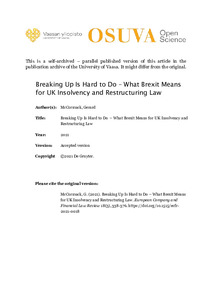Breaking Up Is Hard to Do : What Brexit Means for UK Insolvency and Restructuring Law
McCormack, Gerard (2021-06-15)
McCormack, Gerard
De Gruyter
15.06.2021
Julkaisun pysyvä osoite on
https://urn.fi/URN:NBN:fi-fe2022032424858
https://urn.fi/URN:NBN:fi-fe2022032424858
Kuvaus
vertaisarvioitu
©2021 De Gruyter.
©2021 De Gruyter.
Tiivistelmä
This paper asks whether the UK can maintain its insolvency and restructuring pre-eminence post Brexit i. e. after Britain’s departure from the European Union (EU). In the past 20 years or so, the UK is said to have become the insolvency and restructuring capital of Europe or in less politically correct terms, the bankruptcy brothel of Europe. In part, this is because of the European Insolvency Regulation which provides for automatic recognition of insolvency proceedings opened in a EU Member State in the other EU Member States. Such proceedings may make provision for the discharge of debts and the restructuring of financial obligations.The specific insolvency law regime is part of a more general European Private International Law framework. With Brexit, the UK has now left this framework without any negotiated replacement agreement, a so-called ‘skinny’ Brexit. The loss of the ability to deal with insolvencies and corporate restructurings through a single process, with automatic recognition across the EU, may make it more complex, lengthy and expensive to resolve cross-border cases. It gives rise to the prospect of parallel proceedings in different jurisdictions. The paper also addresses how any disadvantages associated with the ‘skinny’ Brexit may be alleviated.
Kokoelmat
- Artikkelit [2609]
